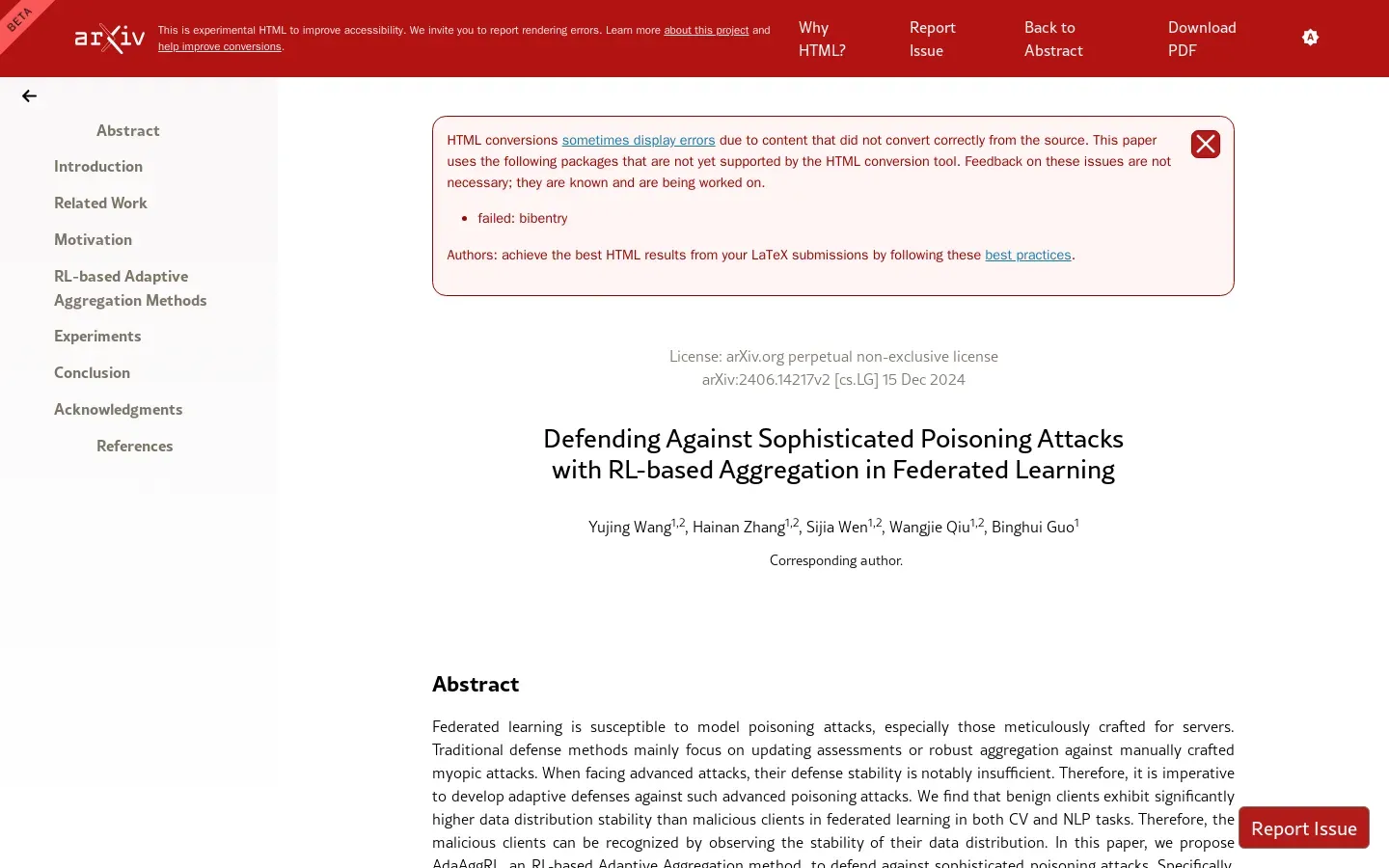
AdaAggRL Enhances Security in Federated Learning Systems
/ 4 min read
Quick take - Recent research has introduced AdaAggRL, an adaptive aggregation method utilizing reinforcement learning to enhance the security of federated learning systems against model poisoning attacks, while also suggesting broader applications in cybersecurity and potential integration with privacy-preserving techniques.
Fast Facts
-
Introduction of AdaAggRL: A new method, AdaAggRL (Adaptive Aggregation via Reinforcement Learning), enhances the security of federated learning systems against model poisoning attacks by dynamically adapting to cyber threats.
-
Key Methodologies: The approach includes distribution learning, similarity calculation using Maximum Mean Discrepancy (MMD), and adaptive weight determination through the Twin Delayed DDPG (TD3) algorithm.
-
Performance Evaluation: AdaAggRL outperforms traditional aggregation techniques, maintaining model integrity even in the presence of non-I.I.D. data and malicious clients.
-
Broader Implications: The research has potential applications in IoT and edge computing, and it opens avenues for cross-domain federated learning and integration with privacy-preserving techniques.
-
Future Research Directions: Suggested areas for further exploration include enhancing adaptive algorithms, expanding applications across industries, and integrating AdaAggRL with other machine learning frameworks for improved security.
Advancements in Federated Learning Security through AdaAggRL
Recent research has introduced a novel approach to bolstering the security of federated learning systems against sophisticated model poisoning attacks. The method, known as AdaAggRL (Adaptive Aggregation via Reinforcement Learning), aims to develop resilient defenses that can dynamically adapt to the ever-evolving landscape of cyber threats. This advancement not only addresses critical vulnerabilities in federated learning but also paves the way for future innovations in secure machine learning applications across various domains.
Key Findings and Methodology
The research focused on several objectives to strengthen federated learning against malicious interventions. A foundational step involved understanding data distribution across different clients in federated learning environments. This was achieved through distribution learning and data simulation, which provided insights into how data is shared and processed.
To detect anomalous behaviors indicative of model poisoning attempts, the study employed Maximum Mean Discrepancy (MMD) for calculating pairwise similarities between model updates. This technique enabled the identification of suspicious activities that could compromise model integrity.
A significant component of the research was the adaptive weight determination via reinforcement learning. The researchers utilized the Twin Delayed DDPG (TD3) algorithm to dynamically adjust the weighting of updates based on their reliability. This adaptive aggregation strategy proved crucial in maintaining model integrity under adverse conditions.
The evaluation phase involved a comprehensive comparison of AdaAggRL with traditional aggregation techniques. Results demonstrated its superior capability to uphold model integrity, even when faced with non-independent and identically distributed (non-I.I.D.) data and malicious client activities.
Implications for Cybersecurity
The implications of this research extend beyond federated learning, offering valuable insights for the broader cybersecurity field. One major implication is the strengthening of defense mechanisms against evolving attacks, making AdaAggRL a vital tool for organizations that rely on federated learning for data privacy and security.
Additionally, the findings suggest potential applications in Internet of Things (IoT) and edge computing environments. As federated learning becomes more prevalent in these areas, AdaAggRL could enhance data processing while preserving user privacy.
The research also opens avenues for cross-domain applications, allowing federated learning systems to operate more securely across diverse platforms and datasets. Furthermore, future research could explore integrating AdaAggRL with existing privacy-preserving techniques, further bolstering the security posture of federated learning systems.
Strengths and Limitations
While the research presents significant advancements, it is essential to recognize both its strengths and limitations.
Strengths:
- The adaptive nature of AdaAggRL allows for real-time adjustments to defense strategies, promoting resilience against advanced threats.
- The use of MMD for similarity calculations offers a robust mechanism for identifying malicious updates.
Limitations:
- The research may require further validation in real-world scenarios to assess the practical efficacy of the proposed solutions.
- Exploration of additional techniques and frameworks could be necessary to address potential challenges related to computational efficiency and scalability.
Future Directions
The future of AdaAggRL and its adaptive defenses against model poisoning attacks in federated learning is promising. Potential areas for further exploration include developing enhanced algorithms for adaptive aggregation that can handle more complex attack vectors. Expanding the application of AdaAggRL across diverse industries will help evaluate its effectiveness in various operational contexts.
Moreover, investigating the integration of AdaAggRL with other machine learning frameworks could foster a more holistic approach to security. As these advancements unfold, they will likely play a crucial role in shaping secure machine learning practices across multiple sectors.



